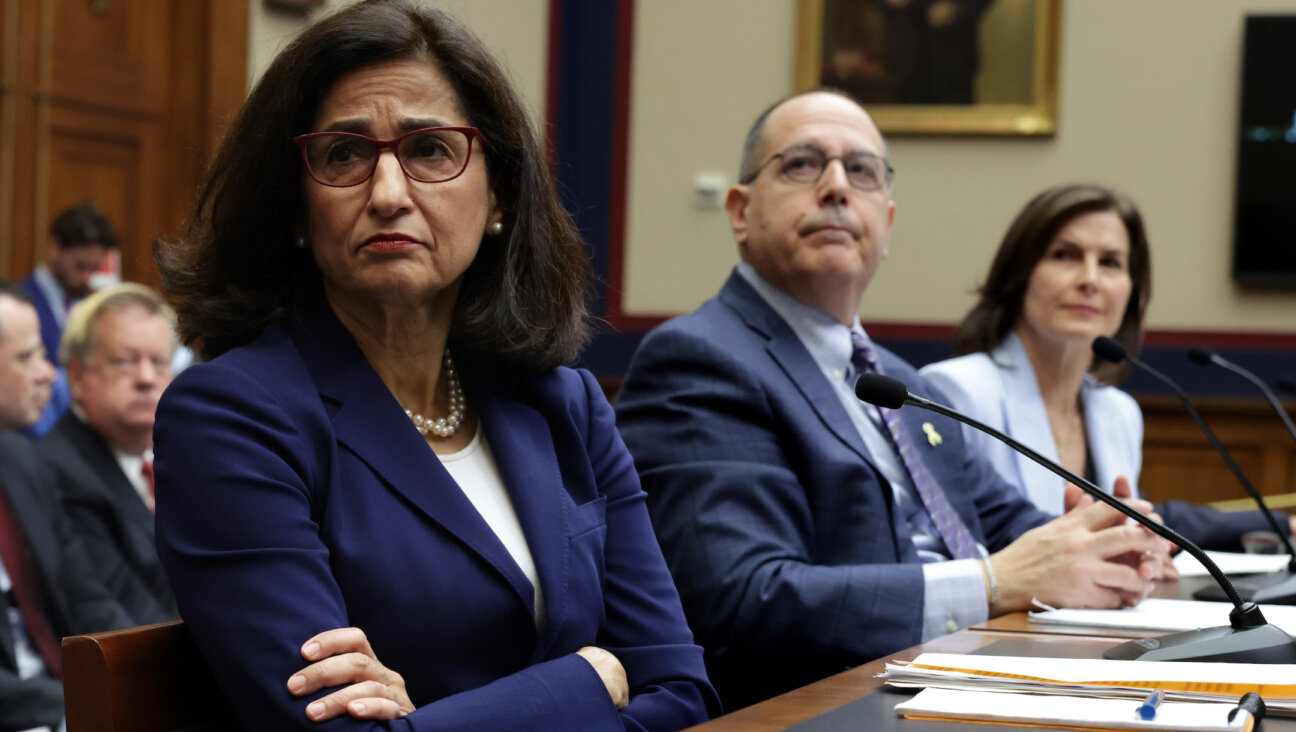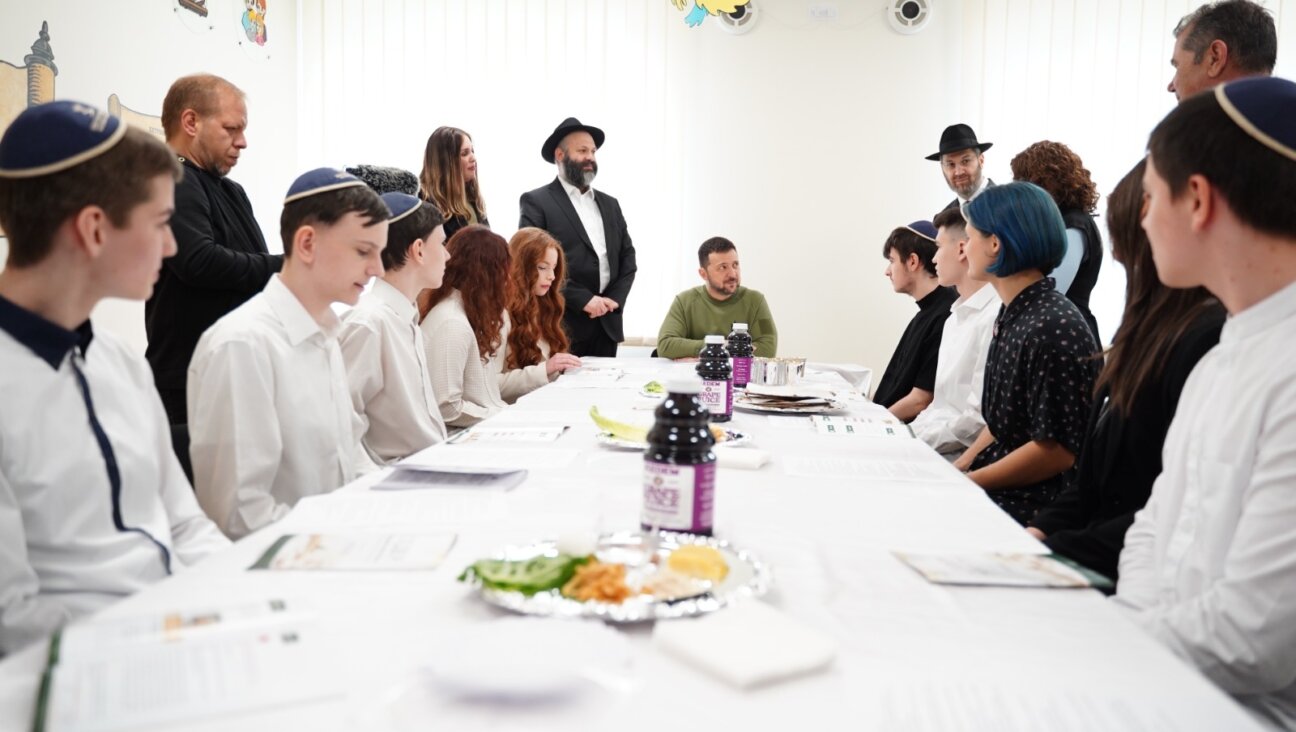Synagogues made COVID-safe High Holiday plans. Then came Delta.

A rabbi blows a shofar during an outdoor Rosh Hashanah service in New York City, Sept. 20, 2020. (Noam Galai/Getty Images)
(JTA) — The leadership team at Ikar, a synagogue in Los Angeles, had just begun planning to move their services indoors. They had gone through a year of virtual services followed by several months of outdoor services for members vaccinated against COVID-19.
Then the Delta variant hit.
Now the synagogue, like many across the country, is reevaluating how to organize its High Holiday services, balancing the high rate of vaccination within the community with the threat from the Delta variant. The community’s medical advisory task force is setting a meeting for early August to decide what it can safely offer when Rosh Hashanah begins on the night of Sept. 6.
“You want to make decisions way in advance, but the ball keeps moving and changing,” said Melissa Balaban, Ikar’s executive director. “And so in some ways, you know, giving it a couple more weeks and seeing what happens is going to be more helpful to us than making a decision right now.”
Decisions about how to plan for yet another holiday season in the shadow of COVID are keeping synagogue leaders up at night. Those decisions range from whether or not to hold services indoors or outdoors, on Zoom or in-person or both, with masks or without, with social distancing or without, and with options available only to the vaccinated or without regard for vaccination status.
For those attending services on the High Holidays, traditionally the most well-attended synagogue services of the year, that means yet another year of not quite “back to normal.”
“Last year, even though we were in the thick of it, I think a lot of folks sort of went with, what are we going to learn from this, what are we going to take from it?” said Rabbi Sari Laufer of Stephen Wise Temple in Los Angeles. “Now we’re a year later and I think we’re not where we even thought we’d be this year.”
For many synagogues, the assumption until just a few weeks ago was that the vaccines had made it safe to come back together in person. Many who observed the High Holidays last year over Zoom longed to gather as they always did.
But the rapid spread of the Delta variant has thrown a wrench in those plans.
The risks Delta poses to vaccinated people appear to be low — most of the coronavirus vaccines have remained effective at preventing serious illness and death from the Delta variant, and the vast majority of hospitalizations and deaths from Delta have been among the unvaccinated.
Still, even vaccinated people who have been comfortable socializing with other vaccinated people in small groups may not be comfortable attending Rosh Hashanah services with hundreds of people. And for vaccinated parents of children who are not eligible for the vaccine, the calculations may be different.
Several synagogue leaders said they would be planning multiple options for services with the understanding that some of those plans would be scrapped at the last possible moment.
At Temple Shir Shalom in West Bloomfield, Michigan, the family service will be held at a local football field, with the rabbi and high school students who help lead the service stationed on the track.
“That way everybody can physically distance in the stands, and we can spread out and use the sound systems to be able to project,” Rabbi Daniel Schwartz said. “For those families that aren’t comfortable being in person just yet, we’ll also have a livestream of the service, too.”
Ikar will offer tickets to members only, who will be guaranteed a ticket to only one in-person service on Rosh Hashanah or Yom Kippur. There will also be a livestreaming option for each service.
For those who feel more comfortable gathering indoors in small groups, Ikar will encourage “watch parties” at private homes, where smaller groups of vaccinated members can gather to watch the livestream of services together.
Balaban said the gatherings would “encourage people to be in community with one another, but maybe not in a big crowd, as people might not be comfortable with that yet.”
At Stephen Wise Temple, masks will be required for vaccinated members in the main sanctuary. There will be a livestreaming option as well. And families with unvaccinated children can attend an outdoor service, also with masks.
The Reform synagogue will also offer multiple Zoom discussion groups for those who wish to mimic the experience of being in services for most of the day or for whom Zoom may be the only way they feel comfortable interacting with others.
“We are planning a really multi-access experience,” Laufer said.
At The Jewish Center in Manhattan, Shabbat services are held in the sanctuary with two options: mask-optional sections for vaccinated people as well as mask-required and socially distanced sections for the unvaccinated. (As an Orthodox synagogue, the congregation doesn’t do Zoom or other livestreaming options on Shabbat and holy days.) It also hosts a service on the roof for those who feel more comfortable in an outdoor setting. Rabbi Yosie Levine said the plan is to keep these options throughout the holidays.
“We actually just had a meeting about it this week with our advisory committee. And the conclusion of the meeting was that we’re not changing any of the guidelines,” Levine said, though he noted the committee would recommend that high-risk people should wear a mask to services.
For many worshippers at this year’s High Holiday services, there will be some disappointment that services aren’t entirely “back to normal” yet. For others, the return to in-person services may be more than they are comfortable with.
“I think there are some people who are going to be like, I can’t believe you’re making me be masked at an outdoor service, or I can’t believe you’re making me be masked at an indoor service when I showed you that I was vaccinated,” Laufer said. On the other hand, she said, “We definitely have people saying I just want to confirm that we’ll be able to stream services.”
Laufer said the goal this year was to be safe, to gather in-person as much as possible and to upset as few people as possible.
“Last year was easier, [though] emotionally much harder. The feeling of a sense of loss last year was really palpable for all of us,” Laufer said. “I think now it’s harder logistically, the flow charts we had to make — it made my brain hurt.”
—
The post Synagogues made COVID-safe High Holiday plans. Then came Delta. appeared first on Jewish Telegraphic Agency.

I hope you appreciated this article. Before you go, I’d like to ask you to please support the Forward’s award-winning journalism this Passover.
In this age of misinformation, our work is needed like never before. We report on the news that matters most to American Jews, driven by truth, not ideology.
At a time when newsrooms are closing or cutting back, the Forward has removed its paywall. That means for the first time in our 126-year history, Forward journalism is free to everyone, everywhere. With an ongoing war, rising antisemitism, and a flood of disinformation that may affect the upcoming election, we believe that free and open access to Jewish journalism is imperative.
Readers like you make it all possible. Right now, we’re in the middle of our Passover Pledge Drive and we need 500 people to step up and make a gift to sustain our trustworthy, independent journalism.
Make a gift of any size and become a Forward member today. You’ll support our mission to tell the American Jewish story fully and fairly.
— Rachel Fishman Feddersen, Publisher and CEO
Join our mission to tell the Jewish story fully and fairly.
Our Goal: 500 gifts during our Passover Pledge Drive!























